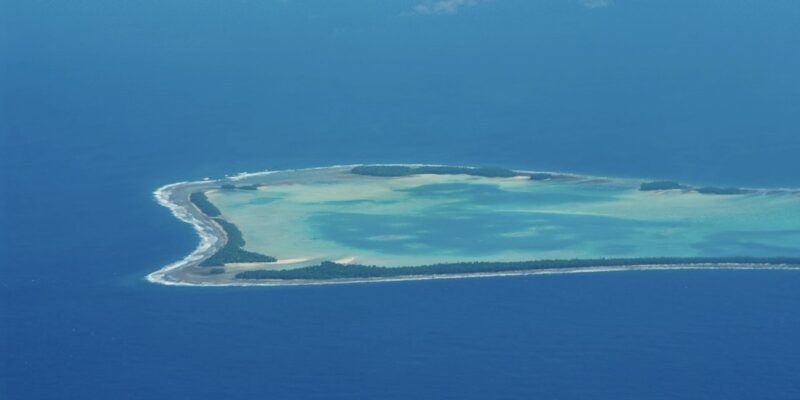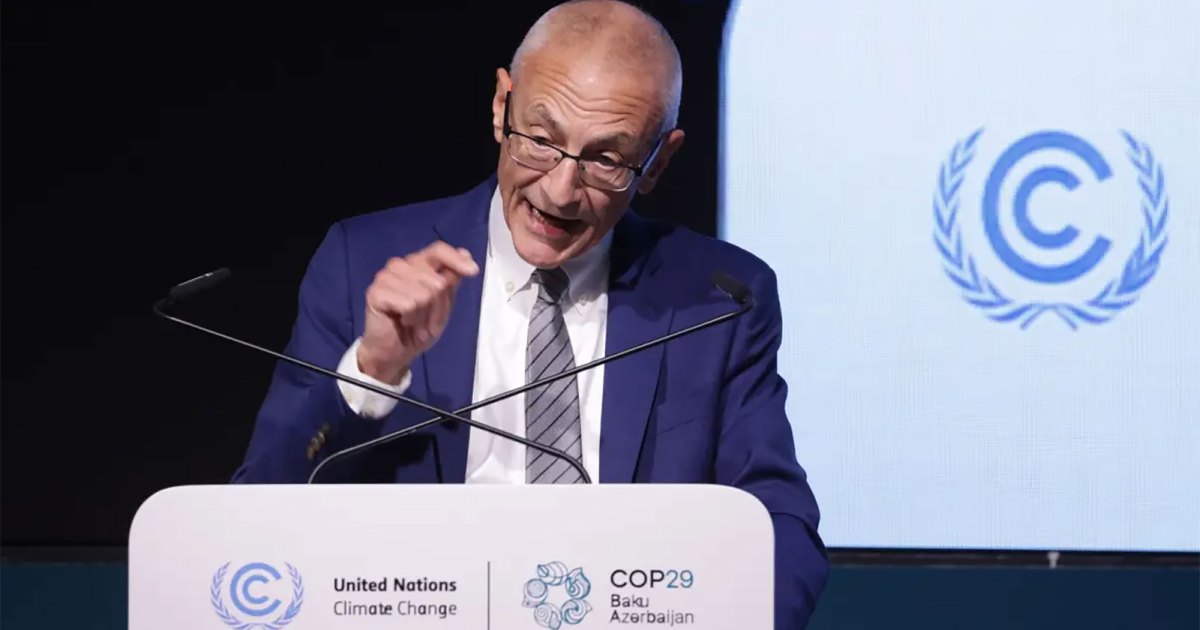
This story was originally published by the Guardian and is reproduced here as part of the Climate Desk collaboration.
Small island nations would rather fight than flee, but rising sea levels have prompted apocalyptic legal discussions about whether a state is still a state if its land disappears below the waves.
The Pacific Islands Forum, which represents many of the most vulnerable countries, has invited international legal experts to consider this question and begun a diplomatic campaign to ensure that political statehood continues even after a nation’s physical fabric is submerged.
At the heart of this discussion is the scientific certainty that oceans will continue to rise for at least another century and a sense of injustice that those worst affected are among the least responsible for the climate crisis. The Alliance of Small Island States represents more than a quarter of the world’s countries, but is responsible for less than 1 percent of global carbon emissions, most of which come from big industrialized countries in the global north.
This has locked in an expansion of the world’s oceans that is already underway and will accelerate in the second half of this century. Island maps are already being slowly redrawn and coastlines are increasingly threatened by storm surges. Within decades, archipelagos could lose outlying atolls that define national borders. A century from now—if not sooner—entire states could become uninhabitable, raising doubts about what will happen to their citizens, governments and resources.
The World Bank had said current regulations on these matters were drawn up in a period of climate stability and may need to be reassessed to account for an “unprecedented situation for international law”.
At a conference on this topic in Fiji this year, the prime minister of the Cook Islands, Mark Brown, framed this debate in a series of existential questions: “As our shorelines are eaten away by sea level rise, what will become of our sovereignty, of our lands, our titles, our homes? What will become of our fundamental rights and freedoms guaranteed by our constitutions and the Universal Declaration of Human Rights? How can we realize our shared vision when our very status as ‘states’ is being questioned? How can we fulfill our responsibility to our peoples if their homes and livelihoods are taken away from them? These questions are difficult but real. They require solutions.”
Simon Kofe, the foreign minister of Tuvalu, one of the most vulnerable nations, stressed the need for a redefinition of global rules and a recognition of what is due to citizens of the worst-affected countries. “The threats of sea level rise and the erosion of our statehood are not mere hypotheticals, but very real and present dangers that we must face head-on,” he said. “Our discourse is not limited to legal instruments and policies but encompasses the survival of our people and nations. We have the power to make a significant impact by acting urgently and decisively.”
The priorities for action are largely determined by the timing of expected impacts. The science of sea level rise is well established, but there are several uncertainties related to future levels of greenhouse gas emissions and the speed at which the Greenland and Antarctic ice sheets melt.
Robert E. Kopp, an earth sciences professor at Rutgers University in New Jersey and one of the lead authors for the IPCC report on global sea level rise, said that a country like Tuvalu was unlikely to be completely flooded until the 22nd century. The possible collapse of the giant Thwaites glacier in Antaractica could bring that forward, but this would take decades.
The more immediate risk, he said, was from storm surges: “It’s not just sea level rise, but when a place gets flooded multiple times a year.” This view was echoed by Peter Girard of Climate Central, who said floods would hit long before total inundation: “It could become impossible to live along the coast without protection.”
Tuvalu and other island states have recently begun reinforcing some of their coastlines with concrete flood barriers, but these are only a partial defense that will diminish over time and always be vulnerable to tsunamis or other big flooding events, as well as to upsurges of groundwater.
Faced by these threats to the integrity of the nation, the protection of legal rights is a priority. In 2020, the Pacific Islands Forum called for international guarantees of existing maritime zones—and the resources within them—even if the land territory is eroded.
More recently, Tuvalu has launched a diplomatic push for other nations to recognize its statehood regardless of the physical impacts of climate change.
Kofe noted that the definition of statehood under international law was reflected in the Montevideo convention, which sets out four criteria: a physical territory, population, government, and the capacity to enter into relations with other countries. “If we were to take that definition, Tuvalu could possibly lose its status as a state if we lose our physical territory or we are forced to relocate to a different location,” he said. “So we are just imagining this worst-case scenario—if it does come to that, we would want the world to continue to recognize our statehood as being permanent.”
So far, seven governments have made this commitment: Venezuela, the Bahamas, Saint Kitts, St Lucia, Vanuatu, Niue, Palau, Gabon and Taiwan. Tuvalu is also discussing the matter with bigger neighbors such as New Zealand and Australia.
Tuvalu is also digitizing its government to make it easier to relocate, while legal scholars have considered whether statehood could be continued by leasing land in another country.
Patricia Galvão Teles, a member of the International Law Commission who participated in the conference in Fiji, noted the historical precedents of governments in exile during wartime, or the historical relocations of the Holy See and the Sovereign Order of Malta.
However, in those cases, the moves were temporary and away from a homeland that remained physically intact. A state that evacuates because of climate pressure may find it harder to prove its long-term viability if its land is under ever more water. The loss of productive land and other economic resources might also make it difficult to meet international obligations to protect the assets of its citizens, maintain embassies or pay for membership of global organizations.
Galvão Teles noted that international law does not have a special legal category for climate refugees or people affected by sea level rise, so it is necessary to rely on existing agreements on human rights and refugees. If states can continue as political entities regardless of the physical loss of land, she said, the question of statelessness would probably not arise until “much further down the road”. However, there could be complications if people evacuate to another nation that does not allow dual citizenship or the registration of births of foreign nationals.
One solution, raised by the World Bank, would be to merge with another state, as Zanzibar and Tanganyika did in 1964 to form Tanzania.
Delegates at the conference said speculation about a landless state and stateless citizens should not distract from the more pressing task of persuading big emitters, such as the United States, Europe, China and India, to cut greenhouse gases, which was the most effective way of reducing pressure on the oceans.
Galvão Teles said the delegates at the Fiji conference wanted to counter the narrative of climate refugees and disappearing nations. “The new initiative is one of ‘rising nations’ and the message is, ‘We are not drowning, we are fighting,’” she said. That meant more emphasis on making industrial nations take responsibility for the problem and reduce emissions. “If you concede you will disappear, there will be less engagement on mitigation and adaptation measures,” she said.
Henry Puna, secretary general of the Pacific Islands Forum, stressed that climate action was the best chance for small island nations to guarantee their rights and their survival. “We must not lose sight of the bigger picture,” he said. “Ensuring that we keep [rises in] global temperatures below 1.5 degrees Celsius must always remain a top priority for us.”















